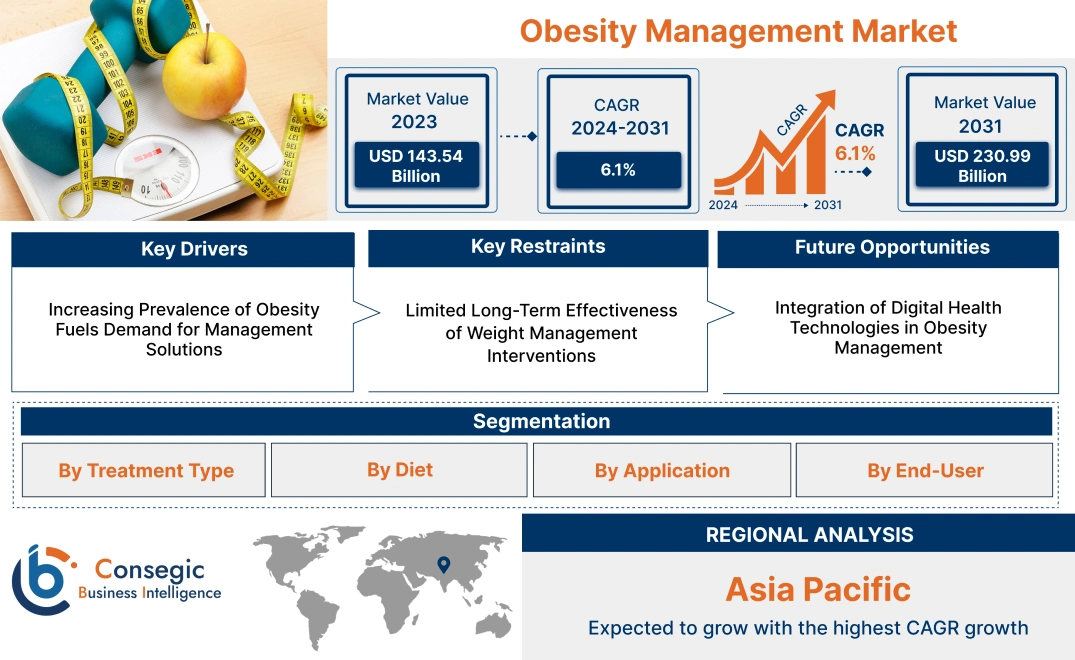- Summary
- Table Of Content
- Methodology
Obesity Management Market Size:
Obesity Management Market size is estimated to reach over USD 230.99 Billion by 2031 from a value of USD 143.54 Billion in 2023 and is projected to grow by USD 149.78 Billion in 2024, growing at a CAGR of 6.1% from 2024 to 2031.
Obesity Management Market Scope & Overview:
The obesity management focuses on the prevention, treatment, and management of obesity through a combination of medical interventions, lifestyle modifications, and technological advancements. It encompasses products and services such as weight loss medications, bariatric surgeries, fitness programs, dietary supplements, and behavioral therapies. Key characteristics of obesity management solutions include tailored treatment plans, multi-disciplinary approaches, and advanced technologies like minimally invasive surgical procedures and digital health tools. The benefits of obesity management include improved metabolic health, reduced risk of comorbidities, enhanced quality of life, and long-term weight control. Applications span clinical settings, wellness programs, and personalized treatment plans for patients with obesity and related complications. End-users include hospitals, clinics, fitness centers, and pharmaceutical companies, driven by the rising global prevalence of obesity, increasing awareness of its health implications, and advancements in medical and therapeutic interventions.
Obesity Management MarketDynamics - (DRO) :
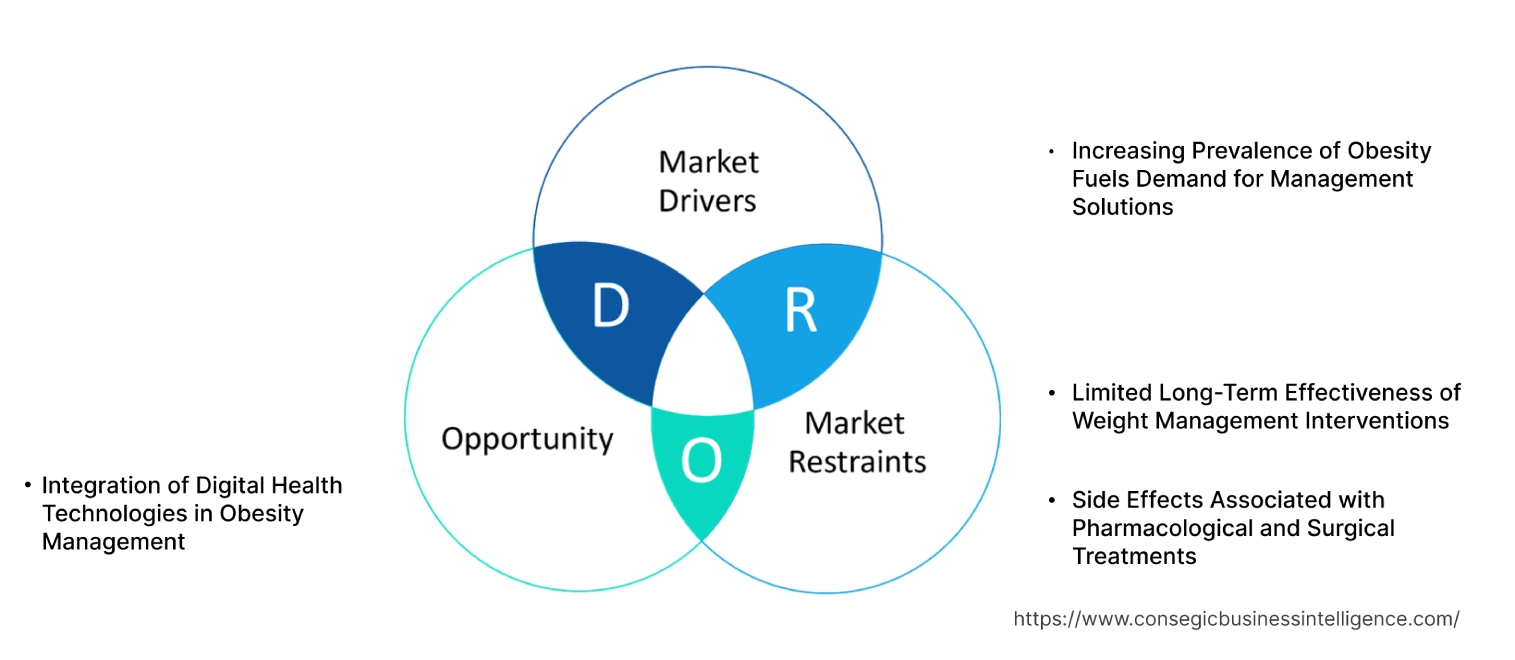
Key Drivers:
Increasing Prevalence of Obesity Fuels Demand for Management Solutions
The rising prevalence of obesity worldwide is a significant driver for the obesity management market. Factors such as sedentary lifestyles, unhealthy dietary habits, and genetic predispositions have contributed to the growing number of individuals classified as overweight or obese. Obesity is associated with numerous chronic conditions, including type 2 diabetes, cardiovascular diseases, and certain cancers, driving the surge for effective management solutions. Pharmacological interventions, such as GLP-1 receptor agonists, and non-invasive procedures, such as gastric balloon placements, are gaining traction as effective methods for weight reduction. Additionally, the adoption of holistic approaches combining nutritional counseling, physical activity, and behavioral therapy is further boosting the obesity management market demand for global services.
Key Restraints :
Limited Long-Term Effectiveness of Weight Management Interventions
Many obesity management interventions, including pharmacological treatments, behavioral therapies, and surgical procedures, face challenges related to long-term effectiveness. Weight regain after initial loss is common, particularly when patients discontinue treatment or fail to maintain lifestyle changes. This issue is further compounded by the body's adaptive mechanisms, such as metabolic slowdown and hormonal shifts, which resist sustained weight loss. These limitations reduce the perceived efficacy of obesity management solutions, discouraging patients from investing in long-term treatment programs and impacting obesity management market growth.
Side Effects Associated with Pharmacological and Surgical Treatments
Pharmacological treatments and bariatric surgeries, while effective, often come with side effects that hinder their adoption. Weight-loss medications can cause adverse effects such as nausea, gastrointestinal discomfort, and potential cardiovascular risks, deterring patients from pursuing medical treatment. Similarly, bariatric surgeries like gastric bypass and sleeve gastrectomy carry risks of complications, including infections, nutritional deficiencies, and long-term digestive issues. These potential risks reduce the appeal of medical interventions, particularly among patients seeking less invasive and safer alternatives.
Future Opportunities :
Integration of Digital Health Technologies in Obesity Management
The integration of digital health technologies offers significant rising potential for the obesity management market. Mobile applications, wearable devices, and telemedicine platforms are increasingly being used to monitor patient progress, provide personalized dietary and exercise recommendations, and enhance treatment adherence, further creating obesity management market opportunities. Digital therapeutics, such as virtual coaching programs and AI-driven platforms, enable healthcare providers to remotely track patient outcomes and offer real-time interventions. These technologies empower individuals to take an active role in their weight management journey, improving accessibility and engagement. As digital solutions become more sophisticated, they are expected to play a central role in the future of obesity management.
Obesity Management Market Segmental Analysis :
By Treatment Type:
The obesity management market is segmented into pharmacotherapy, surgical devices, and fitness equipment.
The pharmacotherapy segment accounts for the largest revenue share of 41.30% in 2023.
- Pharmacotherapy leads the market opportunities due to the increasing prevalence of obesity and the growing adoption of weight-loss medications.
- Drugs such as GLP-1 receptor agonists (liraglutide and semaglutide) have demonstrated exceptional efficacy in reducing body weight, driving their widespread usage.
- The integration of digital health platforms to monitor patient outcomes further supports the segment's growth.
- Advancements in sustained-release formulations and regulatory approvals of new weight-loss medications continue to boost this segment.
- Pharmacotherapy dominates the obesity management market trends due to its effectiveness in managing obesity-related comorbidities and the growing availability of advanced drug formulations.
The surgical devices segment is expected to account for the fastest CAGR during the forecasted period.
- Surgical devices, including laparoscopic and robotic systems for bariatric surgeries such as gastric bypass and sleeve gastrectomy, are witnessing rapid growth.
- Increasing adoption of minimally invasive procedures, improved patient outcomes, and rising awareness about the long-term benefits of bariatric surgeries are fueling this segment.
- Technological advancements, including robotic-assisted systems, further enhance the efficiency and safety of obesity surgeries.
- Surgical devices are expected to grow rapidly, driven by trends and advancements in minimally invasive techniques and the rising development of effective obesity management solutions.
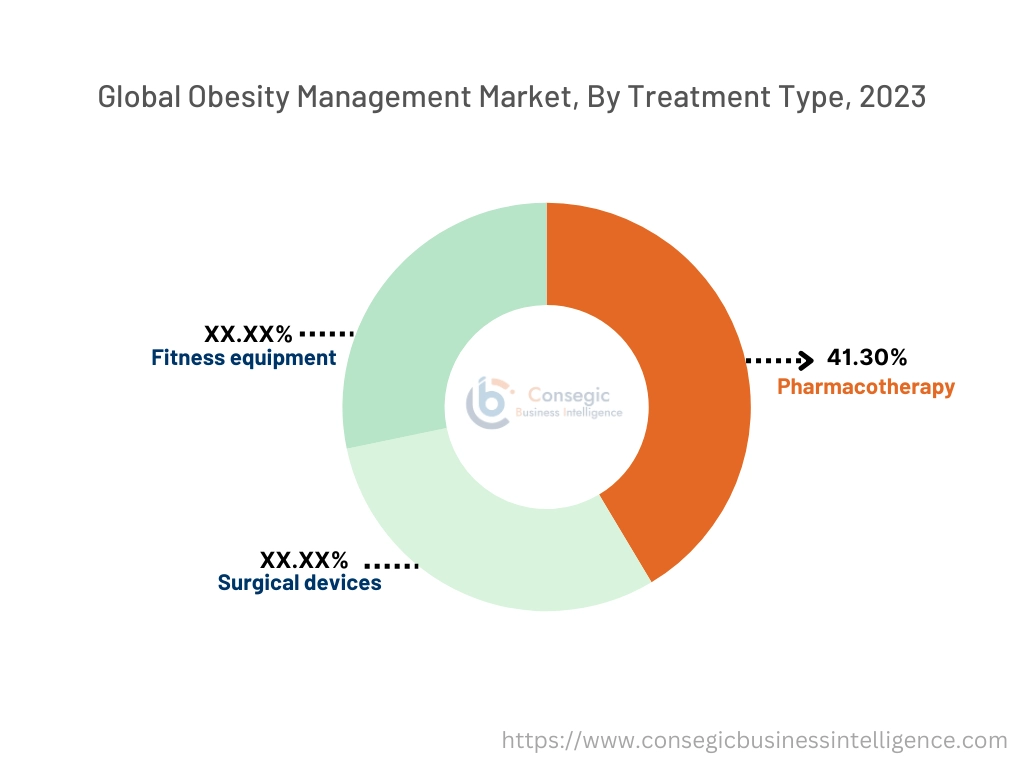
By Diet:
The market is segmented into meals, beverages, and nutraceuticals.
The meals segment accounts for the largest revenue share in the obesity management market share in 2023.
- Structured meal plans tailored for weight loss and maintenance dominate the diet segment.
- Pre-packaged, calorie-controlled meal delivery services, often integrated with digital tracking tools, cater to the increasing demand for convenience.
- Collaborations between nutrition brands and obesity management programs enhance accessibility to structured diet plans.
- Meals lead the diet segment trends, driven by the increasing obesity management market demand for convenient, structured dietary solutions tailored for obesity management.
The nutraceuticals segment is expected to account for the fastest CAGR during the forecasted period.
- Nutraceuticals, including dietary supplements and functional foods, are rapidly gaining popularity for their ability to enhance metabolism, reduce appetite, and promote weight loss.
- The growing preference for plant-based and natural ingredients, coupled with advancements in personalized nutrition, supports the rapid advancement of this segment.
- Nutraceuticals are expected to grow rapidly, driven by increasing trends of consumer demand for natural and personalized weight management solutions.
By Application:
The market is segmented into body shaping, weight maintenance, aesthetic procedures, sports injuries, and chronic wound management.
The body shaping segment accounts for the largest revenue share in 2023.
- Body shaping procedures, including non-invasive fat reduction technologies like cryolipolysis and ultrasound-based treatments, dominate the application segment.
- These technologies offer effective fat reduction with minimal downtime, appealing to a broad demographic.
- Increasing integration of body shaping solutions with weight loss programs enhances their obesity management market trends.
- Body shaping dominates the obesity management market analysis, supported by advancements in non-invasive fat reduction technologies and increasing consumer requirements for aesthetic outcomes.
The weight maintenance is expected to account for the fastest CAGR during the forecasted period.
- Weight maintenance is anticipated to grow rapidly due to increasing awareness of the long-term health benefits of maintaining a healthy weight.
- Digital tools, including wearable devices and apps, are gaining traction for enabling individuals to track their progress and sustain weight loss outcomes.
- The focus on preventing weight regain post-treatment drives this segment.
- Weight maintenance is expected to grow rapidly, driven by rising consumer awareness and the adoption of digital tracking tools for long-term health management.
- Hence, weight maintenance segment analysis depicts, digital tools and devices as key features of market trends supporting the customers in long-term health benefits.
By End-User:
The market is segmented into consulting services and commercial weight loss centers, fitness centers and health clubs, online weight loss programs, and others.
The consulting services and commercial weight loss centers segment accounts for the largest revenue in the obesity management market share in 2023.
- Consulting services and weight loss centers dominate the market by offering comprehensive, customized programs, including behavioral counseling, dietary planning, and fitness management.
- Integration of advanced diagnostic tools and digital health platforms in these centers further enhances their market position.
- Consulting services and commercial weight loss centers lead the market, driven by their ability to provide holistic obesity management solutions.
The online Weight Loss Programs segment is expected to account for the fastest CAGR during the forecasted period.
- Online weight loss programs are gaining significant traction due to their accessibility and flexibility.
- These programs offer personalized dietary and exercise plans, real-time progress tracking, and virtual consultations, appealing to tech-savvy consumers.
- The rise of telehealth and digital health platforms further accelerates the rise of this segment expansion.
- Online weight loss programs are expected to grow rapidly, supported by advancements in digital platforms and the increasing obesity management market demand for remote, personalized weight management solutions.
Regional Analysis:
The regions covered are North America, Europe, Asia Pacific, the Middle East and Africa, and Latin America.
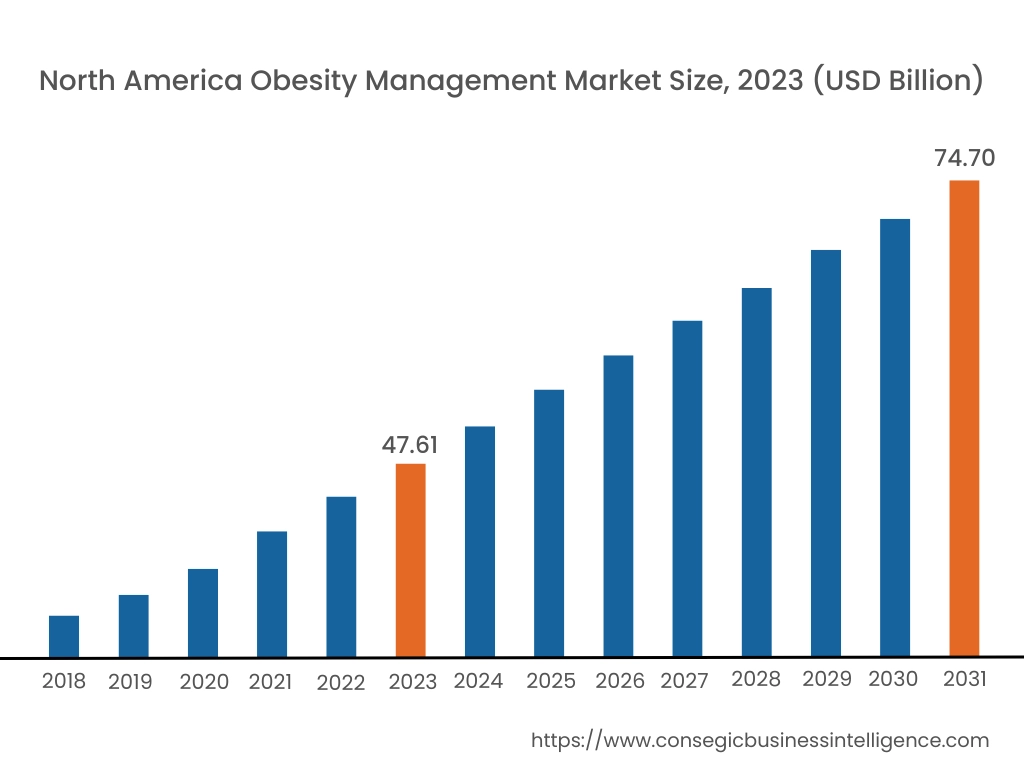
In 2023, North America was valued at USD 47.61 Billion and is expected to reach USD 74.70 Billion in 2031. In North America, the U.S. accounted for the highest share of 73.80% during the base year of 2023. North America holds the largest stake in the obesity management market analysis, driven by high obesity prevalence and strong advancement for weight management programs, pharmaceuticals, and surgical interventions. The U.S. leads the region with significant investments in obesity treatment technologies and the growing availability of FDA-approved anti-obesity drugs. The rise of bariatric surgeries, supported by advanced healthcare infrastructure and insurance coverage, further boosts obesity management market growth. Canada also contributes to the market with increasing awareness about obesity-related health risks and rising adoption of minimally invasive weight-loss procedures. However, the high cost of obesity management treatments remains a challenge for some segments of the population, increasing the probability of hampering the obesity management market opportunities.
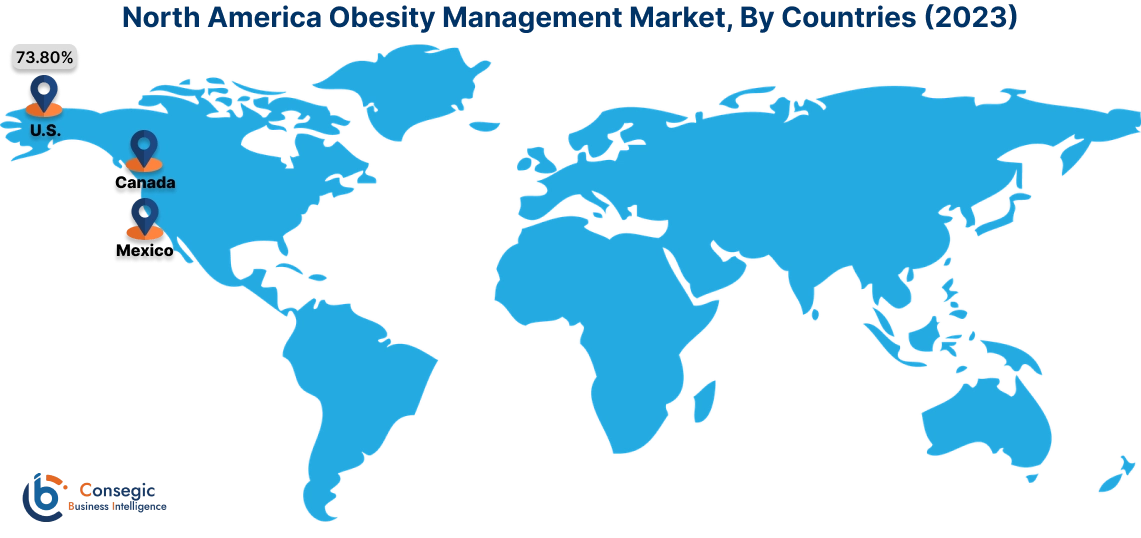
In Asia Pacific, the market is experiencing the fastest growth with a CAGR of 6.5% over the forecast period. Asia-Pacific is the fastest-growing region in the obesity management market, fueled by rapid urbanization, changing dietary habits, and increasing prevalence of obesity in China, India, and Japan. China’s obesity management market analysis shows the rising disposable income and growing focus on fitness and health awareness are driving demand for weight management solutions, including fitness programs and meal replacements. Japan’s aging population and focus on preventive healthcare are boosting the adoption of anti-obesity medications and lifestyle modification programs. India is witnessing an increase in obesity-related comorbidities such as diabetes, driving trends for both medical and non-medical weight management solutions. However, low awareness levels and limited access to advanced treatments in rural areas pose challenges.
Europe is a significant market analysis for obesity management, supported by increasing awareness trends of obesity-related health complications such as diabetes and cardiovascular diseases. Countries like Germany, the UK, and France are leading the market with strong development for weight management solutions, including diet plans, anti-obesity medications, and bariatric surgeries. Germany’s advanced healthcare system and focus on preventive care drive the adoption of obesity management programs. The UK is witnessing a rise in government-led initiatives and awareness campaigns to address the obesity epidemic. However, strict regulatory frameworks for pharmaceuticals and limited access to surgical interventions in some countries can slow market development.
The Middle East & Africa region analysis depicts it is experiencing steady growth in the obesity management market, driven by high obesity rates in countries like Saudi Arabia, the UAE, and South Africa. Saudi Arabia and the UAE are focusing on lifestyle changes and medical interventions, including bariatric surgeries, to combat rising obesity-related health issues. Government initiatives promoting health awareness and investments in advanced medical industry facilities are driving market growth in these countries. In Africa, South Africa is seeing increased requirements for weight management programs due to rising cases of obesity-related diabetes and cardiovascular diseases. However, limited healthcare infrastructure and high treatment costs remain barriers to widespread adoption.
Latin America is an emerging market for obesity management, with Brazil and Mexico leading the region. As per the analysis the rising prevalence of obesity and related comorbidities, such as diabetes and hypertension, is driving a surge for weight-loss solutions. Brazil’s growing healthcare industry and increasing adoption of bariatric surgeries are boosting market growth. Mexico is implementing government initiatives to tackle obesity through lifestyle modification programs and awareness campaigns. However, economic instability and limited access to advanced obesity treatments in certain areas can hinder obesity management market expansion.
Top Key Players & Market Share Insights:
The obesity management market is highly competitive with major players providing products and services to the national and international markets. Key players are adopting several strategies in research and development (R&D), product innovation, and end-user launches to hold a strong position in the global obesity management market. Key players in the Obesity Management industry include -
- Eli Lilly and Company (United States)
- Roche (Switzerland)
- Ethicon, Inc. (United States)
- GlaxoSmithKline plc (United Kingdom)
- Pfizer Inc. (United States)
- Boehringer Ingelheim (Germany)
- Atkins Nutritionals, Inc. (United States)
- Herbalife Ltd. (United States)
- Nutrisystem Ltd. (United States)
- Kellogg Company (United States)
Recent Industry Developments :
Product Launch:
- In Nov 2024, Novo Nordisk introduced Wegovy in China to combat the country's high obesity prevalence. This international launch highlights the growing focus on effective solutions for obesity management worldwide.
Obesity Management Market Report Insights :
| Report Attributes | Report Details |
| Study Timeline | 2018-2031 |
| Market Size in 2031 | USD 230.99 Billion |
| CAGR (2024-2031) | 6.1% |
| By Treatment Type |
|
| By Diet |
|
| By Application |
|
| By End-User |
|
| By Region |
|
| Key Players |
|
| North America | U.S. Canada Mexico |
| Europe | U.K. Germany France Spain Italy Russia Benelux Rest of Europe |
| APAC | China South Korea Japan India Australia ASEAN Rest of Asia-Pacific |
| Middle East and Africa | GCC Turkey South Africa Rest of MEA |
| LATAM | Brazil Argentina Chile Rest of LATAM |
| Report Coverage |
|
Key Questions Answered in the Report
What is the estimated market size of the obesity management market by 2031? +
Obesity Management Market size is estimated to reach over USD 230.99 Billion by 2031 from a value of USD 143.54 Billion in 2023 and is projected to grow by USD 149.78 Billion in 2024, growing at a CAGR of 6.1% from 2024 to 2031.
What are the primary drivers of growth in the obesity management market? +
Key growth drivers include the increasing prevalence of obesity globally, advancements in medical and surgical technologies, and the rising adoption of pharmacological interventions like GLP-1 receptor agonists.
Which segment holds the largest share of the obesity management market? +
The Pharmacotherapy segment dominates the market due to the rising adoption of weight-loss medications and advancements in sustained-release drug formulations.
Which region accounts for the highest market share in obesity management? +
North America leads the obesity management market, driven by high obesity prevalence, advanced healthcare infrastructure, and significant adoption of FDA-approved treatments.
Which region is expected to experience the fastest growth in this market? +
Asia-Pacific is projected to grow at the fastest CAGR over the forecast period, fueled by urbanization, changing dietary habits, and increasing obesity prevalence in China, India, and Japan.
